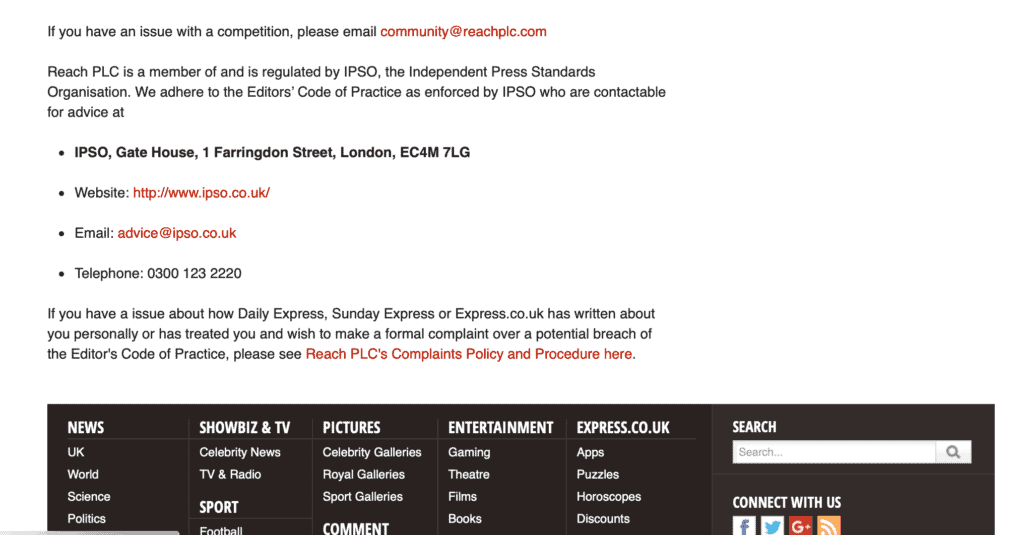On 27 August the Express published an article under their ‘crusade’ to ‘End this injustice’ (in family courts). We were concerned that it contained serious inaccuracies and was misleading. We wrote about that in a post on 30 August : The Danger of Crusades. On 1 September we also lodged a complaint with The Express about those inaccuracies, referencing Clause 1 IPSO Editors’ Code.
This post is about the progress of that complaint (spoiler : we’ve got nowhere).
The complaint
Dear Daily Express Editorial Team,
We are writing on behalf [sic] to complain about an item which appeared in the Daily Express on or around 27 August 2019, apparently only in print copies rather than online. It was also tweeted by the journalist in question, Liz Perkins and has been retweeted a large number of times since. It ran under the ‘End this injustice’ Crusade banner, with the headline ‘All I did was tell the truth…then court threw me in jail’.
The article was significantly inaccurate and misleading, by virtue of freely available factual information that was excluded. Whilst it is quite acceptable for a newspaper to run a campaign and to promote a particular viewpoint it is essential that this is not done in a way that is likely to mislead readers about the case studies relied upon. We think that the article in question was significantly misleading by omission and as such a breach of Clause 1 of the IPSO Editors’ Code. We have also raised concerns about the comment from Ms Hobbs that accompanied the main item, which we think is also likely to have misled readers by omission. For the avoidance of doubt we also consider that the headline itself was misleading by wrongly drawing a connection between the jailing of the interviewee and her voicing the truth as she saw it. Whilst we recognise this appeared in quote marks your journalist must have realised that the assertion made by the interviewee could not be sustained factually. We consider that each of the article, accompanying comment and headline were in breach of clause 1 and that collectively they represent a very serious breach of that clause and of journalistic standards generally – either the journalist failed entirely to conduct any due diligence on Ms Hobbs and Ms Haigh or she cherry picked information to give an entirely false impression to readers in support of the campaign the Express is running.
We have set out our concerns more fully in a blog post here : http://www.transparencyproject.org.uk/the-danger-of-crusades/, the text of which is reproduced below for ease. We request that the contents of this post are treated as part of our complaint.
We have noted the comments from members of the public as the original tweet from your journalist has been retweeted, and these support our concerns about the public being misled about the facts of the case in question.
Since the material in question was published in print not online, but has nonetheless gathered a substantial online reach by means of your journalist publishing it on her twitter feed we suggest that the Express should publish a full apology and correction in a prominent location in a future print edition AND that the journalist should publish a similar apology and correction (or link to such an apology and correction that is published on your website) on her twitter account both in a fresh tweet and immediately below her original tweet publishing the article in the same thread.
We look forward to your response at your earliest convenience.
Yours Sincerely,
Lucy Reed
Chair[Transparency Project Email signature and original blog post pasted at foot of email omitted]
What happened next
The Express is owned by Reach Plc. Their complaints procedure told us to expect acknowledgment within 7 days and an outcome within 28. We didn’t get either, so on 13 September we chased (including the original complaint in our message) ….Nothing.
On 22 September we wrote again (including the original complaint in our message), saying that if we had heard nothing by 4pm on 24 September we would simply submit our complaint to IPSO (Independent Press Standards Organisation).
On 23 September we received an email apologising for the delay, and saying,
it appears that your complaint was not submitted to the correct department. For future reference, please could all complaints be submitted through the complaints form…I note that you have advised that your complaint has now been submitted to IPSO, therefore we will await to hear from them regarding your complaint.

We wrote back to say :
- we’d followed the instructions on their website and submitted our complaint to the email address given (page above)
- to reiterate that we were asking for the Express to deal with our complaint, and that we hadn’t yet submitted our complaint to IPSO.

The Express then told us they were ‘happy’ to deal with our complaint and would ‘strive’ to deal with it in 28 days if we still wished them to do so. We wrote back :
We would always prefer to resolve matters directly with a publisher rather than go to IPSO. However, in view of the serious concerns we have raised in this complaint and the fact that there has already been a delay of three weeks since we submitted our complaint (which we chased several times), we do not think it is reasonable to have to wait a further 28 days, which, if our complaint is rejected would be followed by further delay in progressing matters via IPSO. We will hold off on submitting to IPSO if you are able to commit to a response by not later than 7 October, which we think is reasonable in the circumstances. If you cannot we would be grateful for your confirmation so we can get on with approaching IPSO instead. You will of course be appreciate our concern that the potential for corrections to remedy the damage arising from giving the public inaccurate information is lessened the more that time passes without correction or retraction.
They agreed to respond by 7 October as requested :
Our policy states that we hope to resolve the complaint within 28 days, not to initially respond to your complaint. I will be sure to respond to your complaint in due course, by 7 October at the latest as requested.
However, we weren’t quite sure whether the distinction they seemed to draw between ‘resolving’ and ‘responding’ was significant, so we queried it. Their response was simply to confirm they would ‘respond in full’ by 7 October.
At 10.51 am yesterday (28 September) our correspondent at Reach emailed to ask :
Please could you confirm who you are complaining of behalf of?
We responded immediately to confirm that our chair was complaining on behalf of The Transparency Project (as was self-evident from the original email).
At 11.00 am yesterday Reach emailed as follows :
Having investigated your complaint, we believe the best course of action would be for you to submit your complaint to IPSO.
That’s it. No details of what the investigation (the 9 minute long investigation) concluded. No details of WHY the best course of action would be for us to submit our complaint to IPSO. It seems the distinction between ‘resolve’ and ‘respond’ was significant after all, although we would not class this in any way as a ‘full’ response.
Whilst the Express haven’t bothered to explain their decision to decline our complaint, after making us wait 28 days, we can infer that the Express may take the view they don’t have to deal with a complaint that does not come from an individual directly named in the publication – if that is the case they are wrong : We have successfully argued before that we are entitled to make an inaccuracy complaint to IPSO when we complained about the ‘Bob the Builder’ case as reported by the Mail. In the ruling on our complaint in that case IPSO said :
The Committee first considered the issue of jurisdiction. IPSO is able to consider complaints made by a third party “seeking to correct a significant inaccuracy of published information”. The complaint in this case related to the care taken in reporting a publicly available judgment. There is a public interest in ensuring that court proceedings are reported accurately, and the Committee did not consider that it required the input of those involved in the proceedings in order to make a finding on the accuracy of the reporting in this instance. The Committee decided that it did have jurisdiction to consider this matter.
The full IPSO ruling is here).
What now?
We have written to Reach to express our displeasure at their complaint handling, and are preparing our complaint to IPSO. It will be based on Clause 1 of the IPSO Editors’ Code, will incorporate our original complaint, and we will draw to IPSO’s attention the poor way in which our complaint has been dealt with.
We will keep you updated as best we are able, but the IPSO process bans us from publishing the contents of correspondence unless we have the consent of all involved – and it will come as no surprise that newspapers generally don’t want us to publish their attempts to shut down our complaints.
[UPDATE 4 October 2019 : We have today lodged our complaint with IPSO.]
[UPDATE 4 November 2019 : our complaint to IPSO has been rejected by the Executive. We’ve asked for a review of the decision by the Committee.]
Feature pic : seeing eye by Valerie Everett on Flickr (creative commons – thanks!)
